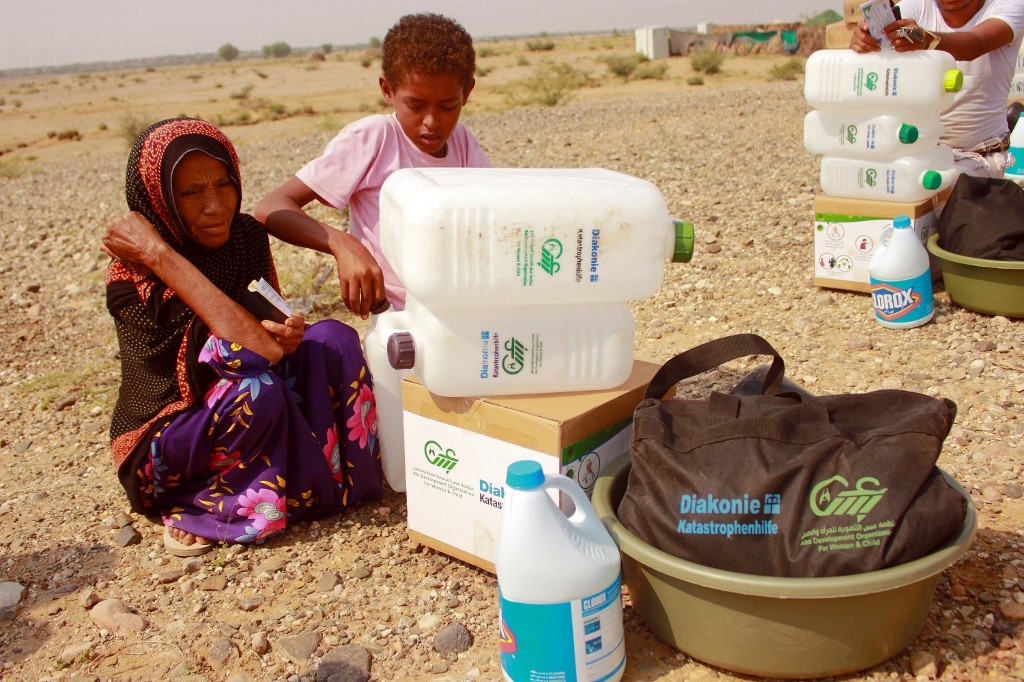Saudi Arabia pledges $204m to UN Yemen aid

Saudi Arabia and Kuwait signed a series of new pledges promising immediate aid money to Yemen, fulfilling part of a commitment made earlier this year, after the UN called out the Gulf nations for not honouring their pledges.
Riyadh has led a military coalition in Yemen since 2015, carrying out almost 22,000 air strikes, according to the Yemen Data Project.
Saudi Arabia on Friday publicly committed to providing $204m in funding to United Nations aid agencies operating in Yemen. The funds are part of the $500m - half of its 2019 commitment - originally pledged by the kingdom at a conference hosted by the UN and Saudi Arabia in June.
According to the UN, three-quarters of Yemen's population of almost 30 million depend on some form of aid for survival.
Yemen has seen a resurgence in fighting with the number of bombings in the first half of 2020 doubling those of the previous six months, and almost 40 percent of them hitting civilian infrastructure, according to aid groups.
The King Salman Humanitarian Aid and Relief Centre (KSrelief) announced Saudi Arabia's renewed commitment in a televised statement on Friday that specified which UN agencies were set to receive portions of the donations.
"Today, the Kingdom of Saudi Arabia… signed three important agreements with UN organisations, namely the World Food Programme, the World Health Organization (WHO) and UNHCR for a total of $204 million," said Abdullah Al Rabeeah, KSrelief's supervisor general.
The food programme will be allocated $138m of the funds, while $46m goes toward the WHO and $20m to the UN refugee agency.
Another $94m set to be donated to the UN has not yet been allocated, in addition to about $200m in funding commitments made in June that Saudi Arabia has yet to fulfill.
Meanwhile, Kuwait, after attending a multilateral meeting on Thursday, pledged to provide $20m to the UN's efforts in Yemen.
Thursday's session was organised by Germany, Kuwait, Sweden and Britain, and included the four other permanent Security Council members - China, France, Russia and the United States - as well as the European Union.
Other countries announced aid pledges during the meeting, but details have not yet been made public.
'A death sentence for many families'
During Thursday's session, Ahmad Nasser al-Sabah, Kuwait's foreign minister and acting defence minister, called the situation in Yemen "extremely alarming," official news agency Kuna reported.
Sabah said it was incumbent upon the international community to lift the Yemeni people out of misery and restore peace and stability amid one of the world's worst humanitarian crises, which has been exacerbated by the coronavirus pandemic.
Thursday's session followed a call for funds made by the UN on Tuesday. At the time, UN Under-Secretary-General for Humanitarian Affairs Mark Lowcock warned the Security Council that the "spectre of famine has returned" in Yemen.
"Several donors - including the Kingdom of Saudi Arabia, the United Arab Emirates and Kuwait, who have a particular responsibility, which they have discharged in recent years - have so far given nothing" to this year's aid plan, he said.
"It is particularly reprehensible to promise money, which gives people hope that help may be on the way, and then to dash those hopes by simply failing to fulfill the promise," Lowcock said.
"Continuing to hold back money from the humanitarian response now will be a death sentence for many families," he said at the time.
The situation in Yemen, already dire amid a five-year civil war exacerbated by foreign influences, has been drastically impacted by the coronavirus pandemic.
As of late June, about 25 percent of confirmed cases in Yemen were fatal, one of the highest Covid-19 mortality rates in the world, with only a few hundred ventilators available for the whole country.
With only half of Yemen's medical facilities functioning and fewer than 10 medics for every 10,000 people, the country is more than 50 percent below the basic health coverage benchmark outlined by the WHO.
US withholds aid
On Wednesday, the US House and Senate sent letters to the US State Department asking the Trump administration to restore $73m in aid to Yemen, which was halted in March.
The cuts were made because of White House concern that the Iran-backed Houthi movement was seizing control of the funds.
Legislators called the cuts "shortsighted," stressing that aid to Yemen was more important than ever, given the extra assistance needed to fight the coronavirus pandemic in the war-torn country.
In the letters, the politicians also asked the department to help put pressure on Gulf states, namely the United Arab Emirates and Saudi Arabia, "to deliver significant contributions to humanitarian funding for Yemen".
Saudi Arabia and the UAE have been leading the military coalition against the Houthi movement in Yemen for years, and are often criticised, particularly by the US Congress, for the civilian death toll caused by Saudi-led air strikes.
In August, the UN warned that Yemen was approaching both famine and economic collapse, after the agency's fundraiser for Yemen in June fell short of its goal by $1bn, leaving a large gap in funding for its aid programmes.
In the letter sent by the House, Democrats slammed Saudi Arabia for having delivered only five percent of its $500m pledge made in June.
The United Arab Emirates has yet to make a pledge for aid funds to the war-torn country.
Famine and hunger are on the rise, and, according to the International Rescue Committee (IRC), if humanitarian assistance does not improve, the number of people facing acute food insecurity this year will increase to about 3.2 million.
Middle East Eye delivers independent and unrivalled coverage and analysis of the Middle East, North Africa and beyond. To learn more about republishing this content and the associated fees, please fill out this form. More about MEE can be found here.







